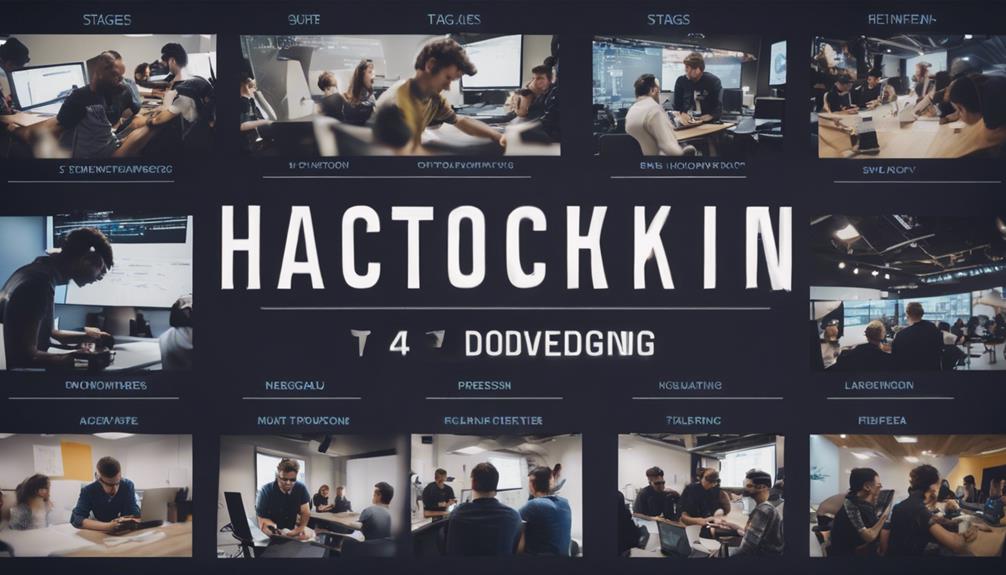Hackathons are like coding marathons where developers team up intensely to craft fresh software or apps swiftly. These events spur innovation, refine coding abilities, and promote quick idea development. Supported by diverse experts, from designers to coders, teams come together to collaborate and learn. Hackathons provide chances for networking, honing skills, and fostering teamwork in a fast-paced environment. The impactful outcomes of hackathons have influenced the tech industry in a substantial manner. Discover more about the various types and stages of hackathons, as well as notable projects born from these collaborative coding endeavors.
Key Takeaways
- Hackathons are coding marathons for developers to create new software or apps.
- Participants collaborate intensively in teams.
- Focus is on creativity, coding skills, rapid prototyping, and innovation.
- Diverse participants include developers and designers.
- Valuable for networking, enhancing skills, problem-solving, and fostering teamwork.
Definition of Hackathons
Participating in hackathons involves developers coming together to collaborate on creating new software or applications within a set time frame. These events are intense coding marathons where teams work collectively to tackle challenges and drive innovation through rapid prototyping.
The focus is on fostering creativity, honing coding skills, and promoting teamwork in a competitive environment. Hackathons serve as platforms for developers to brainstorm, design, and implement solutions, emphasizing the power of collaboration in achieving common goals.
By working together, participants can leverage their diverse skill sets to overcome obstacles and create impactful applications. The fast-paced nature of hackathons encourages developers to think on their feet, adapt quickly to changes, and push the boundaries of what's possible in a short amount of time.
Ultimately, these events showcase the potential for creativity and problem-solving when individuals come together as a team in pursuit of a shared vision.
Participants in Hackathons

A diverse range of individuals, including software developers, designers, project managers, and professionals from various industries, participate in hackathons. These participants come together to collaborate, network, enhance their skills, and showcase their creativity in a competitive yet supportive environment. Hackathons attract a diverse group of individuals with different expertise levels, from beginners to seasoned professionals, fostering a rich environment for learning and innovation.
During hackathons, teams typically consist of 2 to 4 members who work intensively within a limited time frame to develop innovative solutions. The collaborative nature of these events encourages participants to share knowledge, leverage each other's strengths, and push the boundaries of what's achievable in terms of problem-solving and product creation. By working together in hackathons, participants not only enhance their technical skills but also build valuable connections and gain insights into different industries, making these events highly rewarding for all involved.
Benefits of Hackathons

Hackathons offer a range of benefits to participants, including valuable networking opportunities where individuals can connect with industry professionals and potential employers.
Additionally, these coding marathons provide a platform for enhancing coding skills, problem-solving abilities, and creativity, fostering personal growth and professional development.
Networking Opportunities
During hackathons, attendees have the valuable opportunity to connect with industry professionals, potential employers, and like-minded individuals, fostering beneficial networking experiences.
These events serve as platforms for participants to form new partnerships, exchange ideas, and build relationships, enhancing their professional network.
Networking at hackathons can lead to job opportunities, collaborations on future projects, and mentorship from experienced professionals in the field.
Engaging with sponsors, judges, and fellow participants during hackathons can open doors to new career paths, internships, and business ventures.
Additionally, networking opportunities at hackathons can help participants gain insights into industry trends, technologies, and best practices, fostering continuous learning and growth.
Skill Enhancement Opportunities
Participants at hackathons can greatly enhance their coding skills by engaging in hands-on experience and collaborative learning opportunities. Hackathons provide a dynamic environment for individuals to immerse themselves in new technologies, tools, and programming languages, fostering rapid skill development.
By tackling real-world challenges within a limited timeframe, participants sharpen their problem-solving abilities and ignite their creativity. Additionally, hackathons offer a unique chance to network with industry professionals, mentors, and potential employers, opening doors for valuable career development opportunities.
The collaborative nature of hackathons also cultivates teamwork skills, allowing participants to work effectively in diverse groups and under pressure. Overall, engaging in hackathons not only boosts coding proficiency but also enhances confidence and professional growth.
Whether honing technical expertise, expanding industry connections, or refining soft skills, hackathons serve as a catalyst for continuous learning and skill enhancement in the fast-paced world of software development.
Stages of a Hackathon

At the onset of a hackathon, the event typically kicks off with an introduction and explanation of the theme. Participants engage in idea pitching, where they propose concepts for projects they aim to work on during the event.
Following this, teams are formed, bringing together individuals with diverse skills to collaborate on coding projects. The hackathon then enters the stage of project development, where teams work intensively within a set time frame, ranging from a few hours to a few days, to create functional software or hardware prototypes.
Towards the end of the event, teams present their final projects to judges or mentors, who provide feedback and guidance to help refine the solutions. Collaboration, creativity, problem-solving, and innovation are central to the hackathon experience, offering participants valuable networking opportunities, skill development, and a competitive environment to showcase their abilities.
Types of Hackathons

Differentiating themselves by their focus areas and objectives, hackathons come in various types tailored to specific interests and industries. Student hackathons aim to enhance technical skills and foster innovation among students, while language-specific hackathons revolve around coding in particular programming languages such as Python or Java.
Industry-specific hackathons target sectors like healthcare, finance, or education, offering tailored solutions to industry challenges. Corporate hackathons, like those held by Google and Amazon, stimulate innovation and partnerships within companies. Application-specific hackathons focus on creating software for specific platforms like mobile apps or web development.
Additionally, hackathons can be internal, meant for employees within a company, or external, open to participants from different organizations. Each type of hackathon serves a unique purpose, whether it's honing skills in a specific programming language, addressing industry-specific issues, or fostering innovation within a corporate setting.
Planning a Hackathon Event

When organizing a hackathon event, meticulous planning is vital for its success. To organize a successful hackathon, we must first define clear objectives, set specific rules, form diverse teams, and prepare for engaging project presentations.
Key aspects of planning include securing a suitable venue that can accommodate participants and necessary equipment, determining the event's duration to make sure ample time for development, coordinating with sponsors to provide resources and support, and outlining judging criteria to evaluate projects effectively.
Effective communication is essential in sharing event details, expectations, and schedules with participants, sponsors, and stakeholders. Utilizing resources such as online platforms, project management tools, and communication channels can streamline the planning process.
Additionally, incorporating networking sessions, workshops, and team-building activities can enhance the overall hackathon experience, fostering engagement and collaboration among participants. By meticulously organizing and planning each aspect of the hackathon event, we can set the stage for a successful and rewarding coding marathon.
Examples of Hackathon Successes

Hackathons have birthed renowned products like Zapier and Talkdesk, showcasing their impact on the tech industry. These coding marathons are catalysts for collaboration and innovation, fostering a creative environment for developers to push boundaries and create groundbreaking solutions.
Notable hackathon projects have demonstrated the power of collective efforts in driving technological advancements and shaping the future of technology.
Notable Hackathon Projects
Moreover, Several notable hackathon projects have emerged as successful products, shaping the tech industry in significant ways.
One such project is the creation of GroupMe, a popular group messaging app, which originated during a TechCrunch Disrupt hackathon. This app revolutionized how people communicate in groups, showcasing the power of collaboration and innovation in a coding marathon setting.
Additionally, Zapier, a widely used automation tool, was also born out of a hackathon project, highlighting the potential for impactful creations at these events. The hackathon environment fosters creativity and teamwork among developers, leading to the birth of groundbreaking ideas like the introduction of Twitter's hashtag feature, which changed the landscape of social media conversations.
Moreover, Talkdesk, a successful cloud-based call center software, started as a hackathon project, demonstrating how these events can spark the creation of robust and thriving companies in the tech industry.
Impact on Tech Industry
How have hackathons directly influenced the tech industry landscape through impactful projects?
Hackathons have profoundly shaped the tech industry by fostering innovation and collaboration among developers in intense coding marathons. Success stories such as the creation of the 'Like' button on Facebook, GroupMe messaging app, Twitter's hashtag feature, Zapier automation tool, and Talkdesk call center software exemplify the deep impact of hackathons on software and app development.
These projects, born out of hackathons, showcase the ability of these events to drive advancements in the tech industry. The collaborative nature of hackathons provides a platform for developers to experiment, brainstorm, and create groundbreaking solutions that have the potential to revolutionize various sectors.
These successes underscore the importance of hackathons in not only generating new ideas but also in translating those ideas into tangible and successful tech products that shape the digital world we live in today.
Collaboration and Innovation
During a TechCrunch hackathon, the popular group messaging app GroupMe was created, exemplifying the collaborative and innovative spirit that characterizes successful hackathon projects. The collaboration among developers at these coding marathons often leads to the creation of groundbreaking software and apps.
For instance, the 'Like' button on Facebook, a ubiquitous feature today, originated from a hackathon project, showcasing the power of innovation in these events. Additionally, automation tools like Zapier, which streamline workflows by connecting different apps, have their roots in hackathons, highlighting the potential for creating efficient solutions through collaborative efforts.
Moreover, successful products such as Talkdesk, a cloud-based call center software, and the event-driven platform IFTTT, both emerged from hackathon projects, underscoring the impact of collaboration and creativity in driving innovation. These examples demonstrate how hackathons serve as fertile grounds for developers to experiment, ideate, and create software that revolutionizes the tech industry.
Frequently Asked Questions
What Is a Hackathon in Programming?
In programming, a hackathon is an intense coding event where teams collaborate within a short timeframe to create software solutions. It fosters innovation, learning, and networking, often resulting in new products or concepts.
What Is the Point of a Hackathon?
The point of a hackathon is to foster innovation and collaboration among developers, encouraging rapid problem-solving and creative thinking within a set time frame. Participants showcase skills, build prototypes, network, and learn new technologies.
What Is an AI Hackathon?
In an AI hackathon, we develop innovative solutions utilizing AI tech. We create AI models or apps within a timeframe. Industry experts guide us. Outcomes vary from chatbots to image recognition systems. It's a platform for skill showcase and startup launch.
What Is a Hackathon for Students?
Oh, you know, just a casual event where students casually gather to casually solve problems or create projects within a set time frame. No biggie. Just enhancing technical skills and fostering creativity.
Conclusion
To sum up, hackathons are exciting events where developers come together to innovate and create new software.
Did you know that over 70% of hackathon participants report learning new skills during these events?
With benefits such as networking opportunities, skill-building, and the chance to work on innovative projects, hackathons are a valuable experience for any developer looking to expand their knowledge and collaborate with like-minded individuals.









